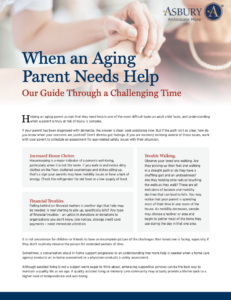How to Talk to Parents About Assisted Living
Our Guide to Having the Difficult Conversation
Helping an aging parent accept that they would benefit from assisted living or assistance in their home is one of the most difficult tasks an adult child faces. Understanding when a senior living at home is unsafe or at risk of injury is complex.
If your parent has been diagnosed with dementia, the answer is clear: seek assistance now. But if the path isn’t so clear, how do you know when your concerns are justified? Don’t dismiss gut feelings. If you are routinely noticing several of the signs listed below, work with your loved one to schedule an assessment for age-related safety issues with their physician. Sometimes, an assessment by a home care agency or physician can lead to an understanding that more support is necessary than an adult child can provide.
Ivy Gables Senior Living is pleased to share our guide to helping aging parents understand the benefits of assisted living or supportive services. It includes advice from experienced social workers, home care professionals, and caregivers who have helped guide hundreds of families through this journey. Please contact the Ivy Gables Sales Team if you have any questions!
Signs That an Aging Parent Is Declining
- Increased house clutter: Housekeeping is a major indicator of a person’s well-being, particularly when it is not the norm. If you notice dirty clothes on the floor, cluttered countertops and dishes piling up, that’s a sign your parents have mobility issues or a lack of energy. Check the refrigerator for old food or a low supply of food.
- Financial challenges: Watch for changes in financial ability or patterns like overdue bills, unusual donations or credit card charges. These require immediate attention.
- Trouble walking: Holding onto rails, shuffling feet, or touching walls while walking are indicators of balance and mobility declines that can lead to falls. Another sign of mobility issues in seniors is when someone spends most of their time in one room or starts piling up items around a sofa or recliner.
How to Initiate Conversations About Aging with Parents
Helping aging parents who are showing aging-related declines is challenging but crucial. Before initiating conversations, understand the primary areas where parents may face hazards. They are:
- home safety (mobility and managing stairs, cooking and nutrition, bathing) See our senior home safety checklist.
- driving safety
- managing bills and increased risk for financial scams
Observe your parents for an extended period if you are able, so that you can share some specific concerns during your conversation.
Helping Your Aging Parents: Observed Facts
Begin your conversation with observed changes. Discuss clutter, personal care, and safety concerns. Suggest trying assistance as a temporary measure to alleviate the pressure of making a final decision. Highlight the financial aspects, comparing the cost of care options.
Helping Your Aging Parents: Be Empathetic
Listening to your parents allows you to discover their true feelings. Communicate with empathy, emphasizing that seeking assistance is not a sign of weakness. Offer options and make it clear that your intentions come from a place of care and concern.
Give your parents as much control and as many options as possible. Make sure they know that you are doing this because you care and explain the benefits of assistance. Try, “Mom, you’ve done so much for me. Now it’s my turn to help. What I see is really worrying me. What can I do to help you stay independent knowing that I can’t be here with you because of my job, schedule, or children?”
Rather than saying: “Mom, I need your keys,” try: “How about I make arrangements for transportation for you to your appointments; how can we make this work for you?”
Instead of: “We’re going to arrange some home care services for you. Isn’t that wonderful?” try: “We know this must be difficult for you, and we wouldn’t suggest help if we didn’t think it was the best way for you to remain independent in your home as long as possible.”
Enlist Neutral Parties to Help Talk to Aging Parents
Consider involving a physician or a neutral party such as a clergy member or family friend to provide an objective perspective. Physicians can assess health issues, and an outside perspective can help overcome emotional pitfalls. Discuss potential scenarios, emphasizing the proactive nature of ensuring independence and a good quality of life.
In many cases, a quality assisted living or memory care community can actually provide a lifeline back to a higher level of independence, well-being, and contentment. Learn about the health benefits of assisted living.
Contact us for help! We are happy to talk about the types of senior living that best fit your situation and needs.




